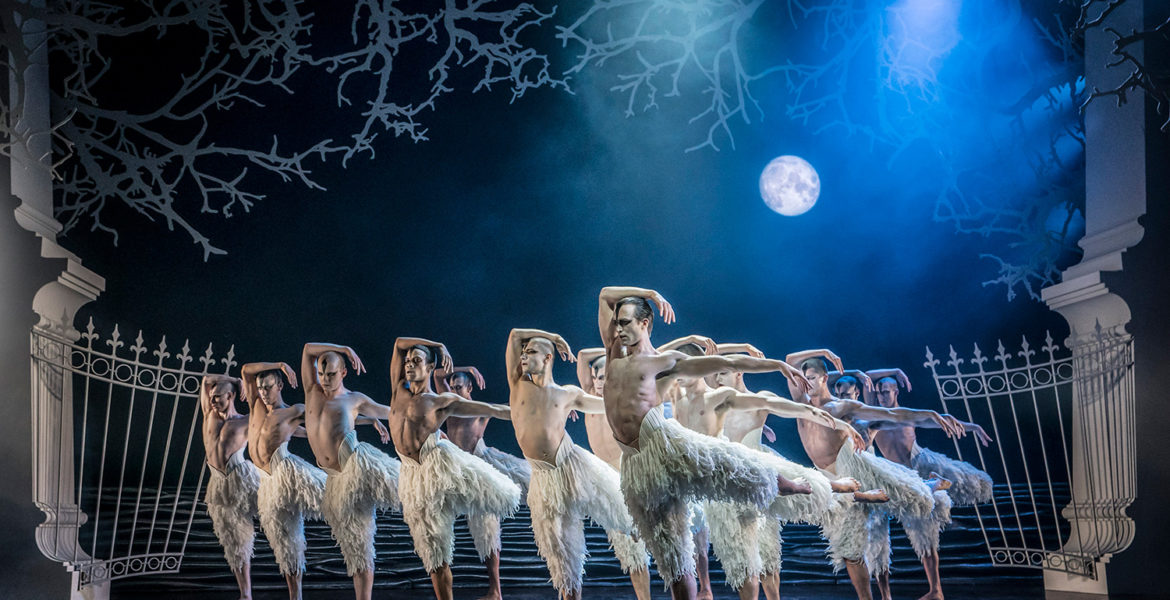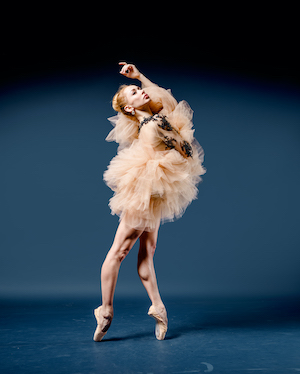The lights dim to the opening tones of Tchaikovsky’s Swan Theme.
A projection of an animated swan slowly and silently starts to beat its majestic wings across the curtain of the Mayflower Theatre.
Matthew Bourne’s Swan Lake has taken flight.
The Prince is in a fitful sleep; his nightmare vision appearing behind him: the stunningly beautiful – albeit menacing – lead Swan, played by Max Westwell.
Before we are entirely seduced by this impressive creature, the apparition fades, the bed becomes a castle turret, and we are plunged into a busy royal household.
Dozens of impeccably uniformed chambermaids and valets, hurry and scurry, dressing and primping The Prince and busying themselves with their duties.
The audience is caught up in this royal whirl, as The Queen bustles from one task to the next: ribbon-cutting, ship-christening, guard-inspecting; dragging the reluctant Prince from pillar to post.
The staging is magnificent in its ordered chaos, interjected with choral shouts from superbly synchronised dancers.
Of course, Brotherston’s sumptuous sets and costumes and Constable’s superb lighting, are full-on conspirators in weaving the spell.

Bourne’s humour is sprinkled throughout, so we are often pushed and pulled between the heart-wrenchingly beautiful and the outright funny.
In Scene 3, Act 1, the royal party take their seats in a theatre box on stage, and what unfolds is a ballet within a ballet, staged both for the characters and the audience.
The garish, over-acted parody of a romantic ballet – complete with cliché backdrop, over-ornate costuming, exaggerated theatrical gestures, stuck-on moustaches and confusing storyline – is both outrageous and hilarious.
However, the dark strands of Swan Lake are never far away.
There is an increasing melancholy and sense of foreboding, as The Prince’s loneliness deepens with an ever-growing detachment from The Queen and his own royal duties.
Thrown into drink-induced moods and the temptation to stray from his royal responsibilities, he finds himself in a raunchy 70s disco, surrounded by bopping, hip-gyrating party-goers.
(All choreographed effortlessly to Tchaikovsky’s music – simply brilliant!)
What shocked audiences when it opened in 1995 – but precisely what has made Matthew Bourne’s Swan Lake iconic – are the male swans.
The audience holds their breath.
Deliciously erotic, athletic, bare-torso-ed man-swans – stunningly dressed in feathered britches – sweep across the moonlit stage in the City Park scene; the lake glistening in the background.
I am riveted.
Both vicious and heartbreakingly graceful, the swans contort and hiss in unison, posturing in strong silences, rolling their necks, shaking a feathered leg, then leaping across the mist-infused scene.
They run swan-circles around The Prince (and the mesmerised audience) adopting classical lines, then shredding them in an instant with their feather-plumping and ruffling, hands as beaks; arms – wing-shaped.
The feather-clad clan is irresistible and magical.
Bourne’s version of the famous Dance of the Cygnets is outstanding, turning the classical pas de quatre on its head.
Four swans stomp comically onto the stage, a satirical take on the original ballet, in which the cygnets are uniformly identical.
These swans teeter on the classical, but not for long, as they break apart, leap and twist, separate and regroup.
The touching pas-de-deux between The Prince (Dominic North) and The Swan, is splendidly balanced between soft, sensuous lifts and residual hissing from a delightfully untameable Westwell.
In true Bourne style, just as you think your heart may break with the bestial beauty of the scene – The Prince rejoicing in his passionate awakening – an elderly head-scarfed woman – shopping trolley in tow – walks into the park to feed the birds.
Bourne toys with our hearts, and we gladly let him.
Like the Odette/Odile roles, Westwell plays both The Swan and The Stranger, dominating the ballroom scene in Act 3.
In leather pants – The Stranger makes his entrance balancing on the balcony balustrade, before entering the ballroom in a gust of testosterone.
He seduces The Queen – at the cruel expense of her son – and brazenly flirts with virtually every guest; bewitching the women and driving their partners into jealous frenzies.
The Prince-Swan pas de deux which follows, contrasts beautifully to the gentle lake-scene duet.

Unbridled passion – matched by restraint and swan-hissing rebuff – lock the two in a red-blooded, emotional struggle and The Prince is lost in this tortuous tussle with desire itself.
In a giddying display of fury and jealousy, The Prince grabs a gun and threatens to shoot his mother. Ridiculed; driven to madness, he is dragged off.
The ballroom scene is sumptuous with its impeccable costuming and eclectic dance styles, but nothing exceeds the finale.
It is the closing act that clenches my heart, leaving its delectable swan-print on my mind.
As The Prince sleeps, swans begin to appear from under his bed.
They swing in from behind the giant headboard, stealthily creeping in from all sides, invading his sleep – swarm-like.
They mount the bed; sniff at him, haunt him; the tension mounting as the swans hiss threateningly, mouths agape, in an arm-flapping, swan infestation.
Gripping stuff indeed and a fine climax to the evening, as the dying Prince is reunited with The Swan, held in his arms for eternity – suspended; dream-like.
The strength of Bourne’s Swan Lake is the amalgamation of the theatrical, comic and tragic in perfect doses.
The elegant poise of the Swan is acknowledged, but it is the bestial ferocity and unpredictability of these dazzling dancing creatures which sets Bourne’s unique version of Swan Lake apart.
I am delighted to say I will never see a park-full of swans in the same light again.
Reviewed on 19th of February at The Mayflower Theatre, Southampton


